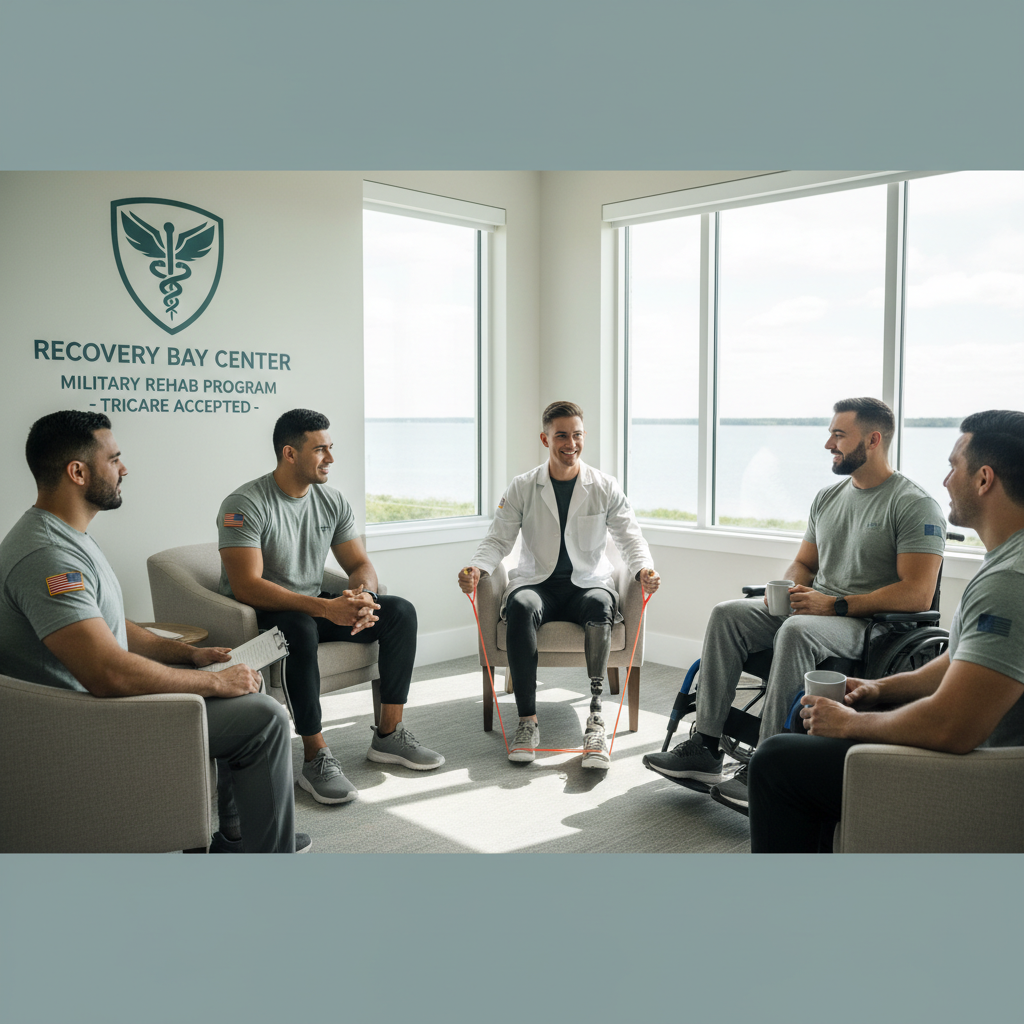Explore trauma group therapy benefits
Trauma can be a profound obstacle on your path to a healthier, more fulfilling life. It often stems from experiences such as childhood abuse, military combat, or sudden loss, and it can affect your emotional well-being in ways that are hard to recognize or address on your own. That is why many individuals, especially men seeking lasting recovery from drug and alcohol dependence, find that trauma group therapy can be profoundly impactful. By coming together in a supportive setting, you can confront underlying struggles, gain new perspectives, and rediscover hope.
What is trauma group therapy?
Trauma group therapy brings individuals with similar traumatic experiences into one carefully structured therapeutic environment. According to Modern Therapy Group, the primary benefit of this approach is the opportunity to connect with those who truly understand the emotional burden you carry. As you share personal stories, receive feedback, and learn new coping strategies, you begin to experience the power of collective healing.
This group-centered approach does not replace one-on-one work, and it may be undertaken alongside individual therapy or trauma informed therapy. However, it amplifies healing by providing a unique circle of support. You are encouraged to express what you have been through, reflect on obstacles with others who relate, and learn effective stress-management techniques. By witnessing how fellow members cope, you can gain valuable tips for your own progression.
Common struggles from unresolved trauma
Unresolved trauma can quietly disrupt various areas of your life, contributing to:
- Intense anxiety or hypervigilance in everyday situations
- Changes in mood or motivation
- Relational conflicts stemming from suppressed emotions
- Persistent feelings of guilt, shame, or self-blame
- Complications in substance use recovery, including prolonged cravings
Statistics from PubMed Central show that around 3.5% of people experience Posttraumatic Stress Disorder (PTSD) at some stage, though the actual numbers may be higher because not everyone seeks help. Each person’s journey looks different, but the support offered by trauma group therapy often transforms a sense of isolation into a shared mission to heal.
Use group dynamics for healing
Group-oriented discussions can alleviate your sense of solitude and stigma, reminding you that you are not alone in these struggles. Men, in particular, may be under social or cultural pressure to avoid discussing fear, grief, or feelings of helplessness. A group therapy setting helps you overcome these barriers by offering a safe, confidential space to open up.
The power of shared experiences
No matter the specific trigger of your trauma, healing in a group underscores how deeply your stories can resonate with those who have walked a similar path. Observing the progress of others, or simply hearing different perspectives on triggers and coping methods, allows you to normalize your own experiences. Sharing intensely personal feelings becomes easier when you see group members bravely doing the same.
Furthermore, there is an element of mutual support. According to Positive Reset Eatontown, trauma group therapy participants often bond deeply, forming connections that extend well beyond therapy sessions. In this circle, you can find not just empathic listeners but also accountability partners who encourage you to build new habits for living substance-free.
Guidance from qualified facilitators
A skilled therapist or counselor guides each session, ensuring a purposeful flow of activities and discussions that allow you to process the trauma in a healthy way. Professional facilitators also create an environment of trust where you feel safe to share. Insights from a Certified Group Psychotherapist (CGP) or a licensed counselor ensure that:
- Group norms are clearly defined, including respect and confidentiality
- Sessions balance open sharing with structured therapeutic activities
- Each member’s unique pace is honored, preventing feelings of overwhelm
Taking part in a well-facilitated group helps you gradually release the burdens you have been carrying. It is an experience grounded in updated therapeutic practices, including trauma-focused Cognitive Behavioral Therapy (CBT), skill-building exercises, and mindfulness-based approaches like yoga and meditation.
Discover Recovery Bay Center’s approach
When you or a loved one is seeking men’s drug and alcohol detox and rehab services, choosing a facility that offers comprehensive support for trauma can make a vital difference. Recovery Bay Center is dedicated to helping you or someone close to you address the underlying emotional issues that may be hindering sustained healing. By integrating trauma group therapy into a broader recovery plan, we create an environment where long-term success is truly achievable.
Tailored services for men’s recovery
Men often face societal expectations that pressure them to hide vulnerabilities. As a result, they might turn to substances to cope. Recovery Bay Center recognizes these unique challenges. Our approach begins with creating a specialized environment that addresses the full scope of men’s emotional and physical needs. While trauma group therapy is a central pillar, we also incorporate:
- Men’s mental health counseling
- Dual diagnosis therapy for co-occurring conditions
- Physical fitness regimens to rebuild strength and confidence
- Family therapy sessions to nurture healthy relationships
- Holistic therapy for a balanced mind and body
This gives you the supportive environment you require to rediscover hope, deal with old wounds, and begin forging a brighter future.
Additional specialized therapies
We also acknowledge that trauma frequently exists alongside other issues, such as chronic stress, grief, or complicating physical ailments. To further empower you, Recovery Bay Center provides a suite of specialized services. Here are a few that often complement trauma group therapy:
- Trauma informed therapy
- Individual therapy
- Psychiatric support therapy when deeper clinical interventions are needed
- Nutrition counseling to help you maintain a balanced diet, crucial for mental well-being
- Structured mental health support for ongoing psychological assessment and adjustment
Through these modes of care, you can tackle the layers of stress and uncertainty that tie into your traumatic experiences. By customizing your treatment, we add another layer of reassurance that every aspect of your journey is heard and addressed.
Follow a typical therapy process
Whether you are struggling with persistent nightmares, flashbacks, or a feeling that past events still define your day-to-day life, trauma group therapy can equip you with a new lens on healing. While specific structures vary, you can anticipate a progression that allows for steady improvement.
Creating a safe environment
From your very first session, group facilitators establish norms around listening, empathy, and mutual trust. This helps you feel comfortable enough to share your story without fear of betrayal or shame. Although it may seem daunting to reveal closely guarded pain, the environment is carefully shaped to protect your emotional well-being.
Depending on your individual needs, this may also be supplemented by:
- On site medical care if you require any treatment for withdrawal or physical issues
- Holistic wellness therapy sessions that introduce tools like meditation and journaling
- Men’s holistic wellness for a thorough system of mind-body reconnection
Tailoring each session to the group’s collective pace promotes a sense of control, ensuring nobody is rushed into sharing sooner than they are ready.
Engaging in peer support
Over the course of several sessions, you begin to experience the transformative nature of peer support. The group dynamic creates a safe environment to try out new coping methods or self-expression techniques. You might find that your peers’ breakthroughs inspire you to reinterpret your past, forge new insights, and reclaim optimism for the future.
These shared reflections also highlight important resilience-building habits:
- Adopting consistent self-care routines
- Learning relaxation exercises that mitigate anxiety
- Discussing experiences openly instead of burying the pain
These newly discovered coping tools can be further developed in other aspects of your treatment plan, such as stress management therapy or relapse prevention therapy.
Monitoring progress over time
As the group progresses, facilitators track each member’s growth, often adjusting session themes or interventions to match evolving needs. If certain members require additional support, they may be referred to more specialized therapy tracks, such as emdr trauma therapy or suboxone treatment rehab for substance dependency issues. Combining group-based trauma work with these specialized therapies ensures you receive comprehensive care for all aspects of your recovery.
In many cases, group participants remain in contact after therapy, moving on to next-level support or continuing sessions in a modified format, such as recovery support groups or an alumni program support network. Fostering such long-term relationships means that you always have someone to turn to when triggers arise or life changes become overwhelming.
Consider professional credentials
One crucial factor to keep in mind when deciding on trauma group therapy is the expertise level of the facilitators or clinicians. Recovery involves deep-seated wounds, and qualified guidance is key to ensuring these wounds heal properly.
Importance of certified group leaders
Professionals who lead trauma-focused group sessions ideally hold an advanced license in mental health counseling or social work, with specialized training in group processes. The American Group Psychotherapy Association sets guidelines that often require hundreds of hours of supervised group experience, ensuring that leaders can respond adeptly to various emotional challenges. When you place your trust in a capable facilitator, you reduce the risk of re-traumatization and optimize your path to healing.
Integrating evidence-based practices
An effective trauma group therapy program often draws on evidence-based protocols, such as:
- Trauma-focused Cognitive Behavioral Therapy
- Eye Movement Desensitization and Reprocessing (EMDR)
- Expressive therapies, such as art or music therapy
- Mindfulness-based stress reduction
According to PubMed Central, delivering cognitive behavioral therapy in a group format is both cost-efficient and time-efficient. It allows for more people to access quality mental health care, an important factor if you or a loved one are balancing multiple responsibilities while seeking healing.
Learn frequently asked questions
Below are some common questions about trauma group therapy and how it fits into a men’s rehab setting. These address concerns about what to expect, how it benefits daily life, and how to ensure it aligns with your unique situation.
What if I am not comfortable sharing personal details with strangers?
It is natural to feel hesitant. A skilled facilitator creates a supportive culture, so you share only what feels safe. Over time, many members discover that hearing others’ vulnerabilities makes them more comfortable disclosing their own.How often do group therapy sessions take place?
Frequency varies; some programs meet once or twice per week. This schedule allows you time to process each session’s discussion and gradually build trust with fellow participants. At Recovery Bay Center, therapists customize session frequency to ensure optimal benefit.Can I supplement group therapy with individual or family sessions?
Absolutely. In many cases, combining group therapy with family therapy or regular individual therapy deepens your progress. This blended approach resolves issues from multiple angles and addresses personal challenges in a more private setting.Is trauma group therapy suitable for all types of trauma?
Most traumas can be addressed within a group, from childhood neglect to combat stress. However, some individuals with acute or complex trauma may require specialized treatment, such as emdr trauma therapy. Recovery Bay Center professionals can help you decide, ensuring a personalized approach to healing.How long does it take to see real progress?
Healing is a deeply personal process, so the timeline varies for everyone. You may notice changes in your stress levels or coping abilities within a few weeks, while other transformations might require months of dedicated work. Commitment and honest communication with your group often speed up progress.
Take your next step
Your journey through trauma recovery can be difficult, but it is also an invitation to rediscover your inner resilience and courage. If you or your loved one is battling substance use and the lingering effects of painful life events, the combination of trauma group therapy and comprehensive men’s rehab services can open new doors to lasting renewal. Surrounded by peers who grasp the depths of your experiences, compassionate facilitators, and a structured environment, you will have the support necessary for lasting recovery.
Trauma group therapy is not just about reliving old wounds. It is about harnessing the power of shared experiences to build better coping skills, deeper self-awareness, and a sense of community you might have never felt before. Through empathetic language, evidence-based interventions, and a steady pace designed to prevent overwhelm, you will gain a renewed perspective on what your life can look like free from the chains of unresolved trauma.
When you choose Recovery Bay Center, you tap into a dedicated setting that recognizes how men’s unique struggles intertwine with addiction, mental health challenges, and unaddressed trauma. From relapse prevention therapy to medical staff detox, from private men’s recovery community to holistic therapy, every route to healing is shaped to support you or your loved one with empathy and expertise. If you are looking for more clarity on how trauma group therapy can transform your journey, do not hesitate to reach out and learn more about how we can help. Our commitment is to walk with you on every step of your recovery, so you can begin the next chapter of your life feeling more empowered than ever before.





